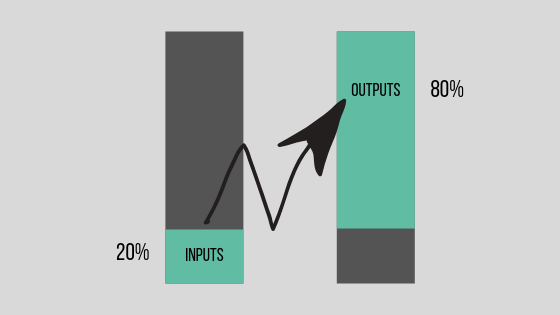
I posted a version of this article on LinkedIn and wanted to ensure the information was also on my website because it’s good stuff!
Most people are familiar with the Pareto Principle or the 80/20 Rule, where 80% of the effects come from 20% of the causes. This universal principle holds true in preparing for an executive job search as well. Through the preparation process, there’s a lot to do: resumes, networking, branding, interview prep, 90-day plans etc. When everything seems important, what’s actually the best use of your time? Here are recommended tips on where you should do both more and less during your preparation.
At the beginning of your search…
Do More – Networking. At the onset of an organization’s search, they always tap their top-leaders as a way to answer the question, “Do you know someone that would be a fit?” Would your name come to the top of anyone’s mind? Because this is the starting point, make sure you’re out there early and often on the front end of your search process. But, before you start networking, you need to be very clear about what you want to do next. Have ideal companies and job details scoped out so that you can relay your thoughts with your network. This way, your people can keep their eyes open for you, knowing precisely what to look for.
Do Less – Resume Perfecting. At the executive level, most job openings are being brokered by an executive search firm. Partner with 1-2 reputable firms and let them orchestrate the transaction. So while you’ll need an initial resume to present the firm, they will have a preferred format for you to use which ultimately goes directly to the hiring organization from the executive recruiter. Although you’ll have to put some effort into updating their format, don’t spend your personal time on the front-end perfecting your own resume. Something simple is fine.
Well into your search…
Do More – Mindset Work. You must show up in 100% confidence and self-mastery in an executive interview to be considered a viable candidate. Your interview performance starts with the mind. Ensure your thinking is supportive of your end goal and you’ve tamed the voice of your inner critic. This voice often takes some form of “I’m not ____ enough”. Unfortunately, there’s no escaping this voice as it’s your brain’s natural way of keeping you safe from an unexpected threat (a new high-level position). 100% of my clients have experienced this in varying degrees of magnitude, which again, is the brain working as designed. The solve? Tackle negative thought patterns with curiosity. Ask yourself, “Where did I get that thought?”; “How do I know it to be true?” and “What could I think instead that would better support my interview preparation process?” Some version of, “I have helpful experience that will support this new organization” can be an effective reframing thought. Next time the critic arises, get curious and reframe.
Do Less General Interview Prep and Do More Specific Interview Question Prep. Preparing your interview responses ahead of time is probably the most essential thing you can do to be viewed as a top contender; however, it matters what you practice. The 80/20 rule applies here in full effect. In an earlier post, I wrote about the top two questions you need to nail in an executive interview. As a reminder, they are: “Why do you want this job?” and “Why should we hire you?” AND, there is a third essential question which measures your strategy & impact, both are crucial for any executive to demonstrate. For all three questions, with response strategies, download my tip sheet here.

